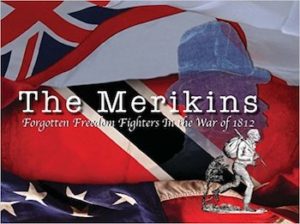
Merikins descendant
*This date in 1814 celebrates the origin of the Merikins. African expatriates of the War of 1812 freed Black slaves who fought for the British against the American colonies.
During the American Revolution, the British recruited freed Black slaves. After that war, they settled in colonies of the British Empire, including Canada, Jamaica, and the Bahamas. During the War of 1812, there was a similar policy. Six companies of freed Black slaves were enlisted into the Corps of Colonial Marines along the Atlantic coast, from the Chesapeake Bay to Georgia. After post-war service in Bermuda, these recruits were established as a community south of Trinidad between 1815 and 16.
On the above date, Vice Admiral Sir Alexander Cochrane, on taking over the command of British forces on the North America station, issued a proclamation offering them a choice of enlistment or resettlement: “All who may be disposed to emigrate from the UNITED STATES will, with their Families, be received on board His Majesty's Ships or Vessels of War, or at the Military Posts that may be established, upon or near the Coast of the UNITED STATES, when they will have their choice of either entering into His Majesty’s Sea or Land Forces or of being sent as FREE Settlers to the British Possessions in North America or the West Indies, where they will meet with due encouragement...”
First stationed at the Royal Naval Dockyard, Bermuda, they rejected government orders to be transferred to the West India Regiments and agreed to be settled in Trinidad. The Governor of Trinidad, Sir Ralph Woodford, wanted to increase the number of small farmers in that colony and arranged for the creation of a village for each company on the Naparima Plain near a former Spanish mission, La Misión de Savana Grande in the south of the island. Local planter Robert Mitchell managed the establishment of the settlements. They were settled in an area populated by French-speaking Catholics. They retained unity as an English-speaking Baptist community, referring to themselves as Americans, which became "Merikins" in the local dialect. Some Company villages and land grants established back then still exist in Trinidad in the 21st century.
The first Merikins settlers were 574 former soldiers plus about 200 women and children. To balance the sexes, more black women were subsequently recruited women who had been freed from other places, such as captured French slave ships. The six companies were each settled in a separate village under the command of a corporal or sergeant, who maintained a military style of discipline. The villages were named after the companies; the Fifth and Sixth Company villages still retain those names.
Each soldier was granted 16 acres of land; some of these plots are still farmed today by their descendants. The land was fertile, but the conditions were primitive; the land had to be cleared, and the lack of roads was a unique problem. Some of the disgruntled settlers returned to America. The rest persisted, building houses and planting bananas, cassava, maize, and potatoes. Rice was introduced in America and was especially useful.
In 1834, the then governor, Lord Harris, confirmed their property rights as stated on arrival, supported improvements to the settlements' infrastructure, and arranged for the settlers to get deeds to their lands. As they prospered, they became a significant element in Trinidad's economy. Their agriculture grew from subsistence farming to cocoa and sugar cane cash crops. Later, oil was discovered, and some descendants could lease their lands for mineral rights or continue as independent market traders.
Many of the Merikins Baptists were from Georgia and Virginia. This religion was reinforced by missionary work by Baptists from London who helped organize the construction of churches in the 1840s. The villages had pastors and other religious elders as authority figures, and there was a rigorous moral code of abstinence and the Puritan work ethic. African traditions were influential, too, including the gayap system of communal help, herbal medicine, and Obeah folk magic and witchcraft. A prominent elder in the 20th century was "Papa Neezer" Samuel Ebenezer Elliot, a descendant of an original settler, George Elliot. He was recognized for his ability to heal and cast out evil spirits. His syncretic form of religion included veneration of Shango, prophecies from the "Obee seed," and revelation from the Psalms. These blended Spiritual faiths and teachings are a legacy of the current Merikin community.
Image: by Marlon Rouse